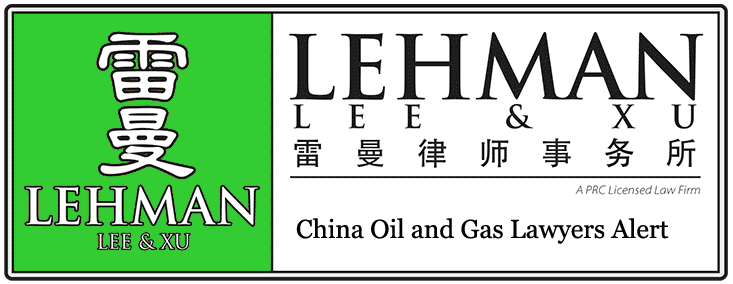
 |
|
LEHMAN, LEE & XU
|
|
China Oil and Gas Lawyers Alert
|
|
January 2012
|
The China Law News keeps you on top of business, economic and political events in the China. |
|
|
|
In the News |
Oil giant subsidiary 'refusing to pay sewage bill |
A subsidiary of China's leading oil refiner Sinopec in Nanjing, capital of the eastern province of Jiangsu, has been accused of refusing to pay more than 80 million yuan (US$12.62 million) in sewage treatment charges. Sinopec Nanjing Chemical Industries Co Ltd is in arrears for sewage treatment charges for four years. Despite final call notices from authorities, it still refused to pay, citing financial difficulties, an unnamed official with the water authority said yesterday. The Nanjing water supply and conservation office has posted 10 tweets on Weibo.com microblogging website urging the company to pay up. Nanjing water authority officials visited the company dozens of times, along with local finance department staff, but Nanjing Chemical Industries has publicly remained silent. In its tweets, the water authority said the chemical plant didn't pay sewage bills in 2006 and from 2009 to 2011. It posted photocopies of the final demand notices issued to the company. It is also reported that Nanjing Chemical Industries has turned in a report to the Nanjing municipal government, hoping to settle the dispute as soon as possible. In earlier media reports, the company claimed that it had serious financial problems. It invested huge sums of money to renovate its water supply system. The chemical plant has its own water source and supplies water to the factory and areas where its employees live. The sewage charge has reached more than 80 million yuan, while Nanjing Chemical Industries has only collected water bills revenue of 43.68 million yuan in the past five years. But the water authority said on Weibo that all companies are obliged to pay for sewage treatment and that no excuses would be tolerated. At odds with the chemical plant's apparent financial plight when it comes to settling utility bills, parent company Sinopec has been exposed as having lavishly spent public funds. In 2009, the firm splashed out 1.6 million yuan on a chandelier to decorate an office building. And last September, its Guangdong branch spent 2.59 million yuan on hundreds of bottles of fine wine and liquor, including Kweichow Moutai and Chateau Lafite Rothschild.
|
Shengli Oilfield Aims To Boost Crude Output |
CHINA'S second largest oil field, Shengli Oilfield, aims to boost its crude oil output to 27.5 million tons in 2012, up 160,000 tons from the target this year. As the flagship oil producing unit of China's state-owned petroleum giant Sinopec, Shengli Oilfield has met the 2011 plan of 27.34 million tons of output, trailing only behind PetroChina's Daqing Oilfield in output. Located in the Yellow River delta bordering the Bohai Sea, the Shengli Oil field was discovered in 1961 and its development began in 1964, with daily production of about 650,000 barrels. China's crude oil production rose 6.9 percent in 2010 to exceed 200 million tons, according to the National Statistics Bureau. |
3rd gas pipeline to open in '13 |
The 5,200 kilometer (km) project will include one artery, six branch lines, three gas storage facilities and a liquefied natural gas (LNG) terminal, the source said, adding that the pipeline will run from the Xinjiang Uygur autonomous region to the city of Fuzhou in Fujian province. |
CNOOC shuts down platforms after subsea pipeline leak |
CNOOC Ltd, China's dominant offshore energy producer, has reported another leak in a subsea gas pipeline that forced it to close production at two fields in the South China Sea. The leakage was found in the pipeline near CNOOC's Zhuhai Hengqin gas processing terminal, the Hong Kong-listed company said in a statement yesterday, adding it has shut down the production of relevant platforms in the Panyu 30-1 and Huizhou 21-1 fields. CNOOC said this would cause a loss of around 26,700 barrels of oil equivalent per day. That's about 22 percent of CNOOC's total domestic gas production, or 3 percent of its total energy production per day. "While it's still unclear how long it will take CNOOC to fix the problem, we expect it to take normally around 3-4 months to fix a subsea pipeline problem," analysts at Sanford C. Bernstein wrote in a note today. No injury or environmental pollution has been reported and the situation is under control, CNOOC said. The cause of the incident is still under investigation. CNOOC has reduced its annual output target to 331 million-341 million barrels of oil equivalent from 355-365 million barrels after China in September ordered all production to be suspended at its 51-percent owned Penglai 19-3 oilfield in the Bohai Bay following two oil leaks that started in June. |
|
|
|
|